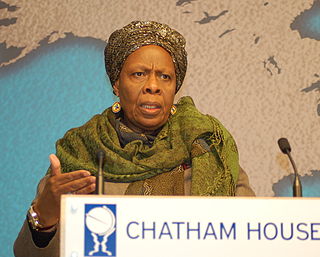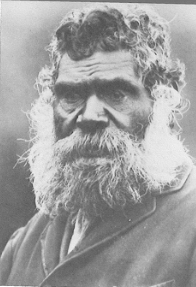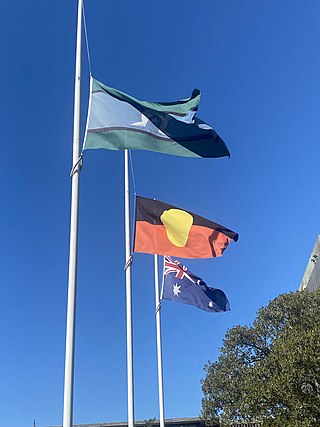The Kaurna people are a group of Aboriginal people whose traditional lands include the Adelaide Plains of South Australia. They were known as the Adelaide tribe by the early settlers. Kaurna culture and language were almost completely destroyed within a few decades of the British colonisation of South Australia in 1836. However, extensive documentation by early missionaries and other researchers has enabled a modern revival of both language and culture. The phrase Kaurna meyunna means "Kaurna people".

Victoria Square, also known as Tarntanyangga, is the central square of five public squares in the Adelaide city centre, South Australia.
Reconciliation Australia is a non-government, not-for-profit foundation established in January 2001 to promote a continuing national focus for reconciliation between Indigenous and non-Indigenous Australians. It was established by the Council for Aboriginal Reconciliation, which was established to create a framework for furthering a government policy of reconciliation in Australia.

The South Australian Museum is a natural history museum and research institution in Adelaide, South Australia, founded in 1856 and owned by the Government of South Australia. It occupies a complex of buildings on North Terrace in the cultural precinct of the Adelaide Parklands. Plans are under way to move much of its Australian Aboriginal cultural collection, into a new National Gallery for Aboriginal Art and Cultures.
Nunga is a term of self-identification for Aboriginal Australians, originally used by Aboriginal people in the southern settled areas of South Australia, and now used throughout Adelaide and surrounding towns. It is used by contrast with Gunya, which refers to non-Aboriginal persons. The use of "Nunga" by non-Aboriginal people is not always regarded as appropriate.
Frank Tenison Brennan is an Australian Jesuit priest, human rights lawyer and academic. He has a longstanding reputation of advocacy in the areas of law, social justice, refugee protection, reconciliation and human rights activism.

A truth commission, also known as a truth and reconciliation commission or truth and justice commission, is an official body tasked with discovering and revealing past wrongdoing by a government, in the hope of resolving conflict left over from the past. Truth commissions are, under various names, occasionally set up by states emerging from periods of internal unrest, civil war, or dictatorship marked by human rights abuses. In both their truth-seeking and reconciling functions, truth commissions have political implications: they "constantly make choices when they define such basic objectives as truth, reconciliation, justice, memory, reparation, and recognition, and decide how these objectives should be met and whose needs should be served".
The Letters Patent establishing the Province of South Australia, dated 19 February 1836 and formally titled "Letters Patent under the Great Seal of the United Kingdom erecting and establishing the Province of South Australia and fixing the boundaries thereof", was presented to King William IV to formally seek the approval to establish the Province of South Australia. It defined the boundaries of the new colony, but also, significantly and unlike the South Australia Act 1834, included recognition of the rights of the Aboriginal peoples of South Australia. It is sometimes referred to as Letters Patent 1836.

A Welcome to Country is a ritual or formal ceremony performed as a land acknowledgement at many events held in Australia. It is an event intended to highlight the cultural significance of the surrounding area to the descendants of a particular Aboriginal clan or language group who were recognised as the original human inhabitants of the area. For the Welcome to be recognised as official, it must be performed by a recognised elder of the group. Welcomes to Country are sometimes accompanied by traditional smoking ceremonies, music or dance. Where an elder is not available to perform the welcome, or there is not a recognised traditional owner, an Acknowledgement of Country may be offered instead.

Tjilbruke is an important creation ancestor for the Kaurna people of the Adelaide plains in the Australian state of South Australia. Tjilbruke was a Kaurna man, who appeared in Kaurna Dreaming dating back about 11,000 years. The Tjilbruke Dreaming Track or Tjilbruke Dreaming Trail is a major Dreaming trail, which connects sites from within metropolitan Adelaide southwards as far as Cape Jervis, some of which are Aboriginal sacred sites of great significance.

Rymill Park / Murlawirrapurka, and numbered as Park 14, is a recreation park located in the East Park Lands of the South Australian capital of Adelaide. There is an artificial lake with rowboats for hire, a café, children's playground and rose garden, and the Adelaide Bowling Club is on the Dequetteville Terrace side. The O-Bahn passes underneath it, to emerge at the western side opposite Grenfell Street.
Arts South Australia was responsible for managing the South Australian Government's funding for the arts and cultural heritage from about 1996 until late 2018, when it was progressively dismantled, a process complete by early 2019. Most of its functions were taken over by the Department of the Premier and Cabinet (DPC) under Premier Steven Marshall, while some went to the Department for Education and others to the Department for Innovation and Skills.

Kevin Buzzacott, often referred to as Uncle Kev, was an Aboriginal Australian rights campaigner and elder of the Arabunna nation in northern South Australia. He campaigned widely for cultural recognition, justice, and land rights for Aboriginal people. He initiated and led numerous campaigns, including against uranium mining at Olympic Dam mine on Kokatha land and the exploitation of the water from the Great Artesian Basin. He also published a collections of poetry, which included the content of his keynote address at a 1998 conference.
Edward Picton "Ted" Mullighan, QC was an Australian judge who was known as an Indigenous rights advocate and protecting vulnerable people. He was known for his role as Commissioner of the Government of South Australia' Children in State Care Commission of Inquiry from 2004 to 2008.

Sekai Holland is a Zimbabwean former politician who served as Minister of State for National Healing, Reconciliation and Integration in the administrations of President Robert Mugabe and Prime Minister Morgan Tsvangirai. Sekai has been involved in campaigning on a number of human rights issues, including those relating to Aboriginal Australians, apartheid in South Africa and the women's rights and democracy in Zimbabwe.

Poltpalingada Booboorowie was a prominent Aboriginal man of the Thooree clan of the Ngarrindjeri nation, who lived among the community of fringe dwellers in Adelaide, South Australia during the 1890s. He was a well-known and popular figure among Adelaide residents, who knew him as Tommy Walker, and his antics and court appearances were reported upon regularly in the newspapers.
The Aboriginal South Australians are the Indigenous people who lived in South Australia prior to the British colonisation of South Australia, and their descendants and their ancestors. There are difficulties in identifying the names, territorial boundaries, and language groups of the Aboriginal peoples of South Australia, including poor record-keeping and deliberate obfuscation, so only a rough approximation can be given here.

Reconciliation in Australia is a process which officially began in 1991, focused on the improvement of relations between the Aboriginal and Torres Strait Islander peoples of Australia and the rest of the population. The Council for Aboriginal Reconciliation (CAR), created by the government for a term of ten years, laid the foundations for the process, and created the peak body for implementation of reconciliation as a government policy, Reconciliation Australia, in 2001.
Major Lancelot "Moogy" Sumner, also known as Uncle Moogy, is an Aboriginal Australian elder, cultural adviser, dancer, and environmental activist in South Australia.

Josephine Marjorie Agius, known as Aunty Josie, was an Aboriginal Australian health and culture educator and elder in South Australia. A Narungga, Kaurna, Ngarrindjeri, and Ngadjuri woman, Agius became well known for her Welcomes to Country at events and organisations.










